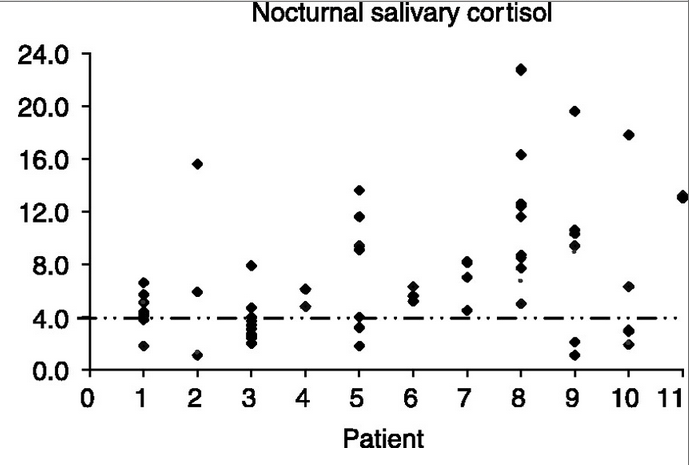Urinary Free Cortisol (UFC) testing has long been the "gold standard" for determining the need for more evaluation in the diagnosis of Cushing's Disease/Syndrome (CS). However, recent research belies the paradigm, especially with cyclic/episodic and mild/subclinical CS.
A fairly recent testing protocol, late-night salivary cortisol (NSC), is often touted as a replacement for the late-night serum cortisol. The ease of use at home has made it a practical application for testing cortisol levels. It, too, has limitations in testing for cyclic and/or mild CS.
A third application, the dexamethasone suppression test (DST), is another standard by which practioners evaluate their patients for CS. Again, there are limitations when evaluating cyclic/mild CS.
In a recent study, the full text article examines the three tests mentioned above. They found UFC's were of limited value whe diagnosing "mild" CS.
However, UFC may not accurately reflect the cortisol secretory state in patients with even the modest impairment of renal function (8). In addition, most of the cortisol secreted during a 24-h period is between 0400 h and 1600 h. Subtle increases in nighttime secretion, as may be seen in mild CS, may not be detected or only intermittently detected in a 24-h urine collection.
Notice the majority of the tests fell below the "normal" line on the graph.
In turn, the NSC was more accurate, but there were many "normals" in the results, with multiple repeats with several patients before obtaining a "high" result. The authors speculate this is due to cyclic CS or a "variability around a mildly elevated set point."
Of the 11 patients evaluated, all had surgery, and 10 of the 11 had pathology proven CS. (Sometimes it is hard to get enough sample tissue for a decent pathology with pituitary surgery.)
The DST was evaluated in this same study with those patients who were tested via that means, but not all patients were. However, in another study, the use of the DST was found to be of limited value for those patients with cyclic/mild CS.
These results demonstrate that the great majority of patients with mild and/or periodic Cushing's syndrome suppress to overnight dexamethasone. Since patients with mild and/or periodic Cushing's syndrome are the patients in whom the identification of hypercortisolism is difficult, our results from this relatively small study suggest that this test should no longer be used to exclude these patients from further workup for Cushing's syndrome.
It is important to remember that no one test adequately evaluates a patient for Cushing's. Even more important, multiple tests may have to be repeated multiple times. The authors in the first article emphasize this when they say, "Obviously [NSC and UFC ] may need to be performed several times before the suspected diagnosis of endogenous hypercortisolism can be correctly identified."
Still a third study (Findling, et al) says, "Even more problematic is the interpretation of the results of these tests, particularly if they are not in agreement with each other. This is particularly so in mild Cushing's syndrome; if the symptoms are subtle, the biochemical abnormalities are likely to be subtle as well." This is a very long article, chock full of information.
How important is it to screen for "mild" CS? "Mild" is a misleading term, sometimes more appropriately called subclinical CS. Findling, et al, point out a huge population where CS is generally overlooked and the depressing mortality for those same folks.
Why is this? Findling lists many reasons, including a study done by Cartagi, et al, where an extraordinarily large percentage of diabetic patients actually had CS. It is often too easy to pin a diagnosis of diabetes or hypertension without realizing it is a symptom.
The recognition of mild/subclinical and cyclic CS has changed the diagnostic approach. Sadly, too many patients are never seen by those who know that.
~~~~~~~~~~~~~~~~~~~~~~
(For more information on how these tests are done, see Testing 101: Biochemical analysis.
For problems/errors to watch for when testing, see When lab tests don't rate an A+, or even a C-..... )
Kidambi, S., Raff, H., Findling, J.W. (2007). Limitations of nocturnal salivary cortisol and urine free cortisol in the diagnosis of mild Cushing's syndrome. European Journal of Endocrinology, 157(6), 725-731. DOI: 10.1530/EJE-07-0424



No comments:
Post a Comment